Shoulder Rotator Cuff Tear
About Shoulder Rotator Cuff Tears
 A shoulder rotator cuff tear is a common cause of pain and disability. A torn rotator cuff will weaken your shoulder making simple, routine daily activities painful, and participation in athletic and sports activities impossible. The head of your upper arm bone fits into a rounded socket in your shoulder blade. This socket is called the glenoid. A combination of muscles and tendons works to keep your arm bone centered in your shoulder socket. These tissues are called the rotator cuff. When one or more of the rotator cuff tendons is weakened or torn, the shoulder tends to ride out of its socket causing pain along with more damage to the cuff tendons. Pain begins with inflammation in the cuff tendons which, if untreated, progresses to fraying in the tendon and eventual tearing. The symptoms can be disabling making lifting your arm, brushing your teeth or combing your hair painful.
A shoulder rotator cuff tear is a common cause of pain and disability. A torn rotator cuff will weaken your shoulder making simple, routine daily activities painful, and participation in athletic and sports activities impossible. The head of your upper arm bone fits into a rounded socket in your shoulder blade. This socket is called the glenoid. A combination of muscles and tendons works to keep your arm bone centered in your shoulder socket. These tissues are called the rotator cuff. When one or more of the rotator cuff tendons is weakened or torn, the shoulder tends to ride out of its socket causing pain along with more damage to the cuff tendons. Pain begins with inflammation in the cuff tendons which, if untreated, progresses to fraying in the tendon and eventual tearing. The symptoms can be disabling making lifting your arm, brushing your teeth or combing your hair painful.
Causes of Shoulder Rotator Cuff Tears
Rotator cuff tears typically result from either injury or degeneration. An acute tear is common if you fall down and land or try to catch yourself on your outstretched arm or if you lift something too heavy with a jerking motion. A degenerative tear most often results from a “wearing down” of the tendon that occurs slowly over time. Degenerative rotator cuff tears often begin with repetitive stress movements affecting the muscles and tendons. This is quite common in many athletic and sports activities such as baseball, tennis, hockey rowing, and weightlifting-all of which expose you to overuse of the rotator cuff tissue. Even work activities, household chores and hobbies can cause repetitive stress from overuse. As we get older, reduced blood supply to the rotator cuff impairs your body’s natural healing and repair abilities and result in a tendon tear. If you develop bone spurs in the shoulder joint, these spurs can rub or “impinge” on the rotator cuff tendon, weakening it and cause it to tear. In general you are at greater risk for a shoulder rotator cuff tear when you are above 40 years of age. People who do a great deal of repetitive lifting or overhead work-such as carpenters and painters, and especially those who are participate in certain sports-such as baseball pitchers or play tennis are at greater risk for rotator cuff tears due to overuse and degeneration.
Symptoms of Shoulder Rotator Cuff Tears
The more common symptoms of a shoulder rotator cuff tear include experiencing pain in the shoulder and over the outside of the upper arm. Reaching, particularly above shoulder height or lying on the shoulder increases pain. With greater injury, pain may occur as an aching sensation when sitting at rest and is accompanied by arm weakness. Tears due to injury can cause immediate intense pain whereas tears that develop slowly due to overuse cause gradual pain and arm weakness. At first, the pain may be mild and only present when lifting your arm over your head, such as reaching into a closet. Over time, the pain may become more noticeable when you rest, and doesn’t get better with medications.
Non Surgical Treatment for Shoulder Rotator Cuff Tears
Conservative non surgical treatment of shoulder rotator cuff tears might require rest and activity restrictions for work, athletic and sports activities. It is important to restrict activities so you do not provoke pain. Physical therapy to strengthen the rotator cuff and supporting shoulder muscles is the main conservative form of treatment. Oral pain medications and oral non steroidal anti-inflammatory medications are helpful. For some patients, injections of steroids to control both inflammation and pain may be helpful especially to allow patients to participate in physical therapy.
To learn more and get help for shoulder rotator cuff tear please Schedule an Appointment with Regenerative Orthopedic & Sports Medicine Specialist Daniel Southern, M.D. in Danbury or Wilton in Fairfield County Connecticut by calling 203-456-5717.


Surgical Treatment for Shoulder Rotator Cuff Tears
For some patients, especially those with continued pain, weakness and a desire to return to an active lifestyle, productive work tasks or specific sports or athletic activities, your doctor may recommend surgery. Depending on the location and the severity of the tear, sometimes it may require “open shoulder surgery”, but more often a rotator cuff repair can be performed using a “mini open” or arthroscopic surgery procedure. During arthroscopic rotator cuff repair, the surgeon places small incisions through which he or she can insert a small camera, called an arthroscope. The camera displays pictures on a television screen, and the surgeon uses these images to guide miniature surgical instruments to complete the repair. In general, recovery time and rehabilitation from surgical rotator cuff repair can be somewhat lengthy and uncomfortable requiring careful pain management.
To learn more and get help for shoulder rotator cuff tear please Schedule an Appointment with Regenerative Orthopedic & Sports Medicine Specialist Daniel Southern, M.D. in Danbury or Wilton in Fairfield County Connecticut by calling 203-456-5717.
Regenerative Orthopedic Medicine Treatment for Shoulder Rotator Cuff Tears
Regenerative procedures provide non-surgical treatment options for those suffering from pain related to osteoarthritis, joint injuries, spine pain, overuse conditions, and common sports injuries. These medical procedures are performed by highly-skilled doctors and are used to help reduce pain and improve function. They may help improve your quality of life, return to the activities you enjoy, and avoid the need for surgery or joint replacement*.
*DISCLAIMER: Like all medical procedures, regenerative procedures have a success and failure rate. Patient reviews and testimonials on this site should not be interpreted as a statement on the effectiveness of our treatments for anyone else.

